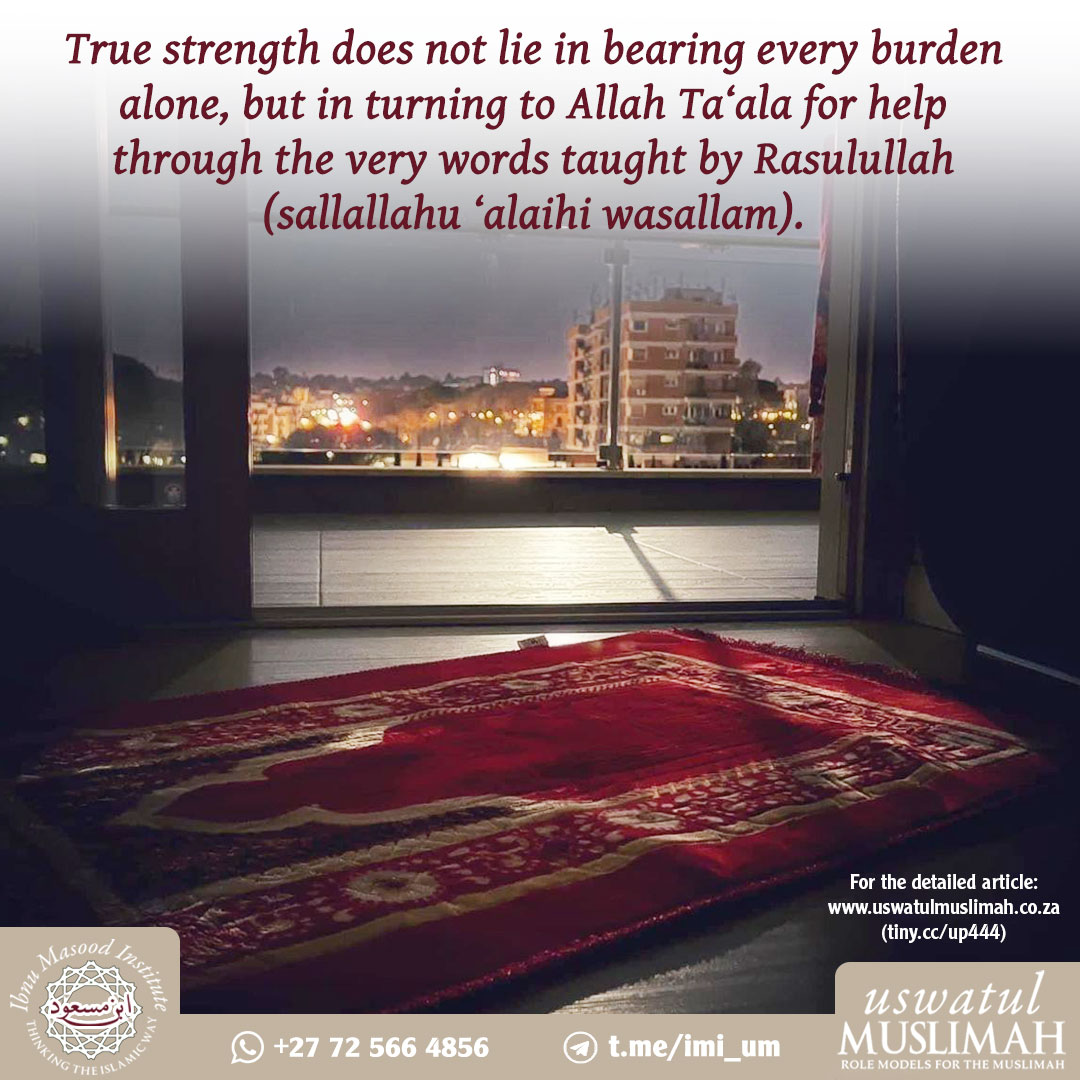Life is never free of challenges. At times there is joy and ease and at times there are difficulties that weigh heavily on the heart. Worry, grief, and hardship are part of being human. Yet, when these emotions overwhelm us, they may hinder our progress in both Deen and our dunya.
The blessed way of Rasulullah (sallallahu ‘alaihi wasallam) offers guidance for every need – emotional, spiritual and physical. When difficulties arise, we often rush to adopt worldly solutions. Islam does not forbid this; indeed, one is commanded to pursue means within the limits of sharee‘ah. Yet, true reliance must always remain on Allah Ta‘ala. Without His help, no effort can bear fruit. Du‘aa is therefore not the last resort but the foremost means – the key that brings blessing into all our endeavours.
Among the priceless treasures left by Rasulullah (sallallahu ‘alaihi wasallam) are concise du‘aas that address the struggles of daily life. One such du‘aa, frequently recited by Rasulullah (sallallahu ‘alaihi wasallam) himself, encompasses many of the burdens that weigh heavily upon the heart:
اَللّٰهُمَّ إِنِّي أَعُوذُ بِكَ مِنَ الْـهَمِّ وَالْـحُزْنِ ، وَالْعَجْزِ وَالْكَسَلِ ، وَالْبُخْلِ وَالْـجُبْنِ ، وَضَلَعِ الدَّيْنِ وَغَلَبَةِ الرِّجَالِ
“O Allah, I seek Your protection from worry and grief, from helplessness and laziness, from miserliness and cowardice, from the burden of debt and from the domination of people.” (Saheeh Bukhaari #6363)
Each of these phrases carry profound meaning:
‘Hamm’ (Worry or anxiety) – the burden of anticipating future difficulties, living in constant fear of what may come. It robs the heart of peace even before a hardship arrives.
‘Huzn’ (Grief) – the pain of past losses, regrets and sorrows that linger, binding a person to what cannot be changed. Concern for the Aakhirah is praiseworthy, but excessive anxiety over the dunya weakens one’s resolve. This du‘aa seeks Allah Ta‘ala’s protection from such destructive emotions.
‘‘Ajz’ (Helplessness) – the state where a person truly lacks the means or ability to act. This incapacity leaves him stranded, unable to move forward.
‘Kasal’ (Laziness) – when a person has the ability and means, yet neglects to act. This weakness stems from within, a surrender of will and energy.
Both are obstacles to progress. One is a deficiency in capacity, the other in determination. Laziness, especially, robs a person of great rewards. This du‘aa also seeks protection from such destructive conditions.
‘Bukhl’ (Miserliness) – It holds a person back from spending in Allah Ta‘ala’s path, depriving him of reward and the purification of wealth.
‘Jubn’ (Cowardice) – It holds a person back from noble actions out of baseless fear.
These two traits are flaws of character: one with regard to wealth, the other with regard to courage. Both qualities weaken a person and prevent him from seizing opportunities for good.
‘Dhala‘id dayn (The burden of debt) – when financial obligations crush a person, leaving him restless, humiliated and unable to live freely. Borrowing in genuine need is permitted, but taking on debt for luxuries is a trap that leads to endless anxiety and humiliation.
Ghalabatir Rijaal’ (The domination of men) – This refers to being overpowered or oppressed by others. A believer should never wrong others, nor allow himself to be humiliated and crushed under unjust domination.
These two are external pressures: from money and from people. Both become burdensome on a person, leaving him stressed and downhearted.
The commentator of hadeeth, ‘Allamah Kirmaani (rahimahullah), described this du‘aa as one of the “jawaami‘ul kalim” of Rasulullah (sallallahu ‘alaihi wasallam) – concise words yet vast in meaning, since this one du‘aa gathers protection from every type of weakness – inner, bodily, and external. (Fat-hul Baari vol. 11, pg. 208)
This du‘aa was not merely theoretical; it was lived and experienced. Sayyiduna Abu Sa‘eed Khudri (radhiyallahu ‘anhu) narrates that once Rasulullah (sallallahu ‘alaihi wasallam) entered the masjid and noticed that one of his companions, Sayyiduna Abu Umaamah (radhiyallahu ‘anhu), was in the masjid whereas it was not the time of salaah. He thus enquired the reason to which Sayyiduna Abu Umaamah (radhiyallahu ‘anhu) replied, “I am burdened with worries and debts, O Messenger of Allah (sallallahu ‘alaihi wasallam)!”
Rasulullah (sallallahu ‘alaihi wasallam) asked him, “Shall I not teach you such words which if you recite, Allah will remove your worry and settle your debt?” He replied, “Definitely O Messenger of Allah (sallallahu ‘alaihi wasallam)!” Rasulullah (sallallahu ‘alaihi wasallam) then told him to recite this du‘aa morning and evening. Sayyiduna Abu Umaamah (radhiyallahu ‘anhu) later explained that he began reciting these words and Allah Ta‘ala removed his worries and settled his debts. (Sunan Abi Dawood #1555)
By reciting this du‘aa daily, morning and evening, a believer shields his mind from anxiety, strengthens his body against weakness, purifies his soul from miserliness and fear and seeks protection from the pressures of debt and domination. True strength lies not in carrying every burden alone, but in turning to Allah Ta‘ala for help with the very words taught by His Rasul (sallallahu ‘alaihi wasallam).
(Adapted from Mirqaatul Mafaateeh vol. 5, pg. 303 and Sharhud Du‘aa minal Kitaabi was Sunnah pg. 542)

